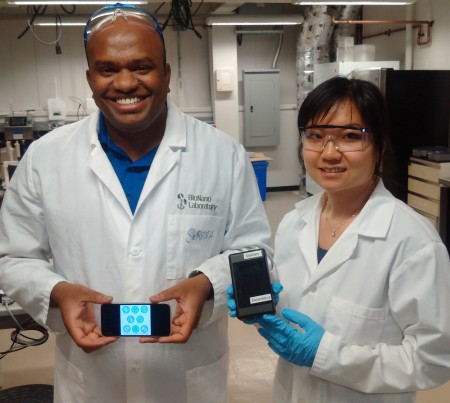In May, his team received a US$125,000 award to conduct field trials with the device, which is an improvement on current livestock testing methods.
And field tests showed farmers are encouraged by the tool’s potential.
“It drastically brings down the time and cost to receive results,” he said. “Right now, multiple vials of blood (each containing between 5 and 10 mL) need to be shipped from farms to a centralized lab. There are also shipping costs and refrigeration costs involved.
“And if the farm is in northern Ontario, there can be an even further delay to finding out the results.”

Prof. Suresh Neethirajan, left, and researcher Xuan Weng with the allergen detector.
Photo: University of Guelph
The device detects ketosis and other metabolic diseases in cows. It works similarly to how people with diabetes check their blood sugar levels, Neethirajan said.
A droplet of blood is placed on a cartridge and, after about 15 seconds, the cartridge is placed in a reader. Farmers can have results in around two minutes. The reader can identify specific biomarkers within the animal.
And more optimization will help farmers and their livestock teams manage herd health in a timelier manner.
“We’re looking at if we can identify multiple diseases from one droplet of blood,” Neethirajan said. “We’re also looking at if we can send the data in real time and incorporating Bluetooth technology so that a veterinarian can receive the information instantly.”
Further plans for optimization include sending the data to feeding systems to allow feed intake to be tailored for the animal’s specific needs and improving the device to detect bovine respiratory illnesses.